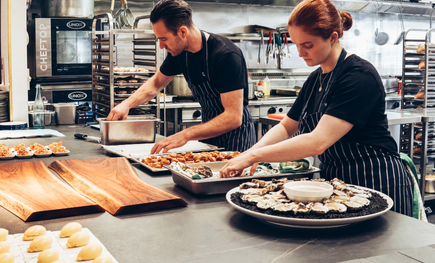In recent years, the restaurant industry has undergone a dramatic transformation. Many restaurants, pressured by changing consumer habits, rising costs, and lingering effects of the pandemic, are turning to alternative service models such as ghost kitchens, catering operations, and delivery-only brands. These pivots offer growth opportunities, but they also introduce legal and compliance issues that cannot be ignored.
If you are a restaurant owner considering a pivot, here are some things you need to know about the legal landscape before you change your business model.
Business Structure and Licensing
Your current business structure may not support the operational or liability needs of a new service model. For example, A sole proprietorship or general partnership might have been sufficient when operating a traditional dine-in restaurant, but expanding into delivery, catering, or ghost kitchens could expose you to new risks. If you are in a limited liability company (LLC), partnership or corporation, before pivoting, you need to consider who needs to be involved in the decision making around such a change.
Key considerations:
- Entity Structure: Consider forming or converting to an LLC or corporation to limit personal liability and better manage multiple business lines (e.g., a catering division and a ghost kitchen).
- Licensing Updates: Any material change to your business activities may require updates to your state business license and your local county or city business office.
- Zoning Compliance: Ghost kitchens and commercial catering operations often operate out of spaces not zoned for standard restaurants. Make sure your location is properly zoned for food preparation and distribution, especially in counties like Arlington and Fairfax, where local zoning ordinances may apply.
Commercial Lease Considerations
If you are leasing your restaurant space, your lease may not automatically allow a pivot to a ghost kitchen or delivery-only model. These changes could conflict with lease terms related to permitted use, signage, or subleasing.
What to review in your lease:
- Use Clauses: Ensure your lease permits the type of operation you are planning. If it’s limited to “dine-in restaurant” “sit down restaurant” or anything similar, you likely need an amendment approved by your landlord to accommodate delivery or catering.
- Subleasing and Shared Kitchens: If you plan to rent space in a ghost kitchen facility or sublease part of your premises, check your lease for subletting restrictions.
- Access and Delivery: Third-party delivery drivers coming and going may require negotiation around access, parking, or hours of operation.
- Percentage Rent: How you calculate delivery service fees as part of your revenue when it is a larger portion of your business may differ.
Health and Safety Compliance
Restaurants must comply with the regulations of its state’s health department whether the restaurant serves customers onsite or not. A ghost kitchen that prepares food for multiple virtual brands will still be subject to inspections and compliance with state and local food safety rules.
Compliance Tips:
- Catering vs. Restaurant Requirements: Catering kitchens may have different structural and sanitation requirements than dine-in restaurants.
- Shared Kitchen Use: If using a commissary or shared commercial kitchen, make sure it is licensed and inspected by VDH (Virginia Department of Health) and that your own operations meet separate health code standards.
- Food Transportation: Catering and delivery operations may also need to comply with rules for transporting perishable food safely.
Labor and Employment Law Implications
Shifting your business model can affect your staffing strategy and expose you to new employment law risks.
Consider the following:
- Worker Classification: Are your delivery drivers employees or independent contractors? Misclassification could lead to wage claims and tax penalties.
- Wage and Hour Laws: Ghost kitchens and catering services often require longer or more irregular hours. Be sure to track employee hours and overtime in compliance with Virginia wage laws.
- Worker Safety: Delivery staff and catering teams may require updated training, safety protocols, and insurance coverage.
Branding, Contracts, and Intellectual Property
Launching a delivery-only brand or multiple virtual concepts requires careful planning to protect your branding and digital presence.
Protect your business by:
- Registering Trademarks: Each virtual brand or catering service name should be protected through federal or state trademark registration.
- Vendor and Partner Contracts: Delivery platform agreements, catering contracts, and shared kitchen use agreements should be reviewed by counsel to ensure fair terms and risk protection.
- Website Terms and Privacy Policies: If you’re launching an online ordering platform, you may need updated website policies that comply with data privacy laws and e-commerce regulations.
Insurance and Risk Management
Many restaurant owners assume their existing insurance will cover new operations—but that likely is not the case.
Be sure to update or expand coverage to include:
- Commercial Auto Insurance: If staff or contractors are delivering food, standard business insurance may not be enough.
- Cyber Liability: For restaurants handling online orders and customer data, cyber liability insurance can help protect against breaches or fraud.
- General Liability and Property Insurance: If operating out of a shared kitchen or off-premises catering site, make sure those spaces are adequately insured under your policy.
Conclusion: Do Not Pivot Without Legal Support
The restaurant industry will continue to evolve—and those who adapt thoughtfully and strategically will thrive. But while pivoting to a ghost kitchen, catering business, or delivery-first model may seem like a simple operational change, the legal and regulatory implications can be complex.
If you are considering launching your next concept, please contact Jennifer Schiffer at 703.526.5590 or jschiffer@beankinney.com.
This article is for informational purposes only and does not contain or convey legal advice. Consult an attorney. Any views or opinions expressed herein are those of the author and are not necessarily the views of the firm or any client of the firm.

